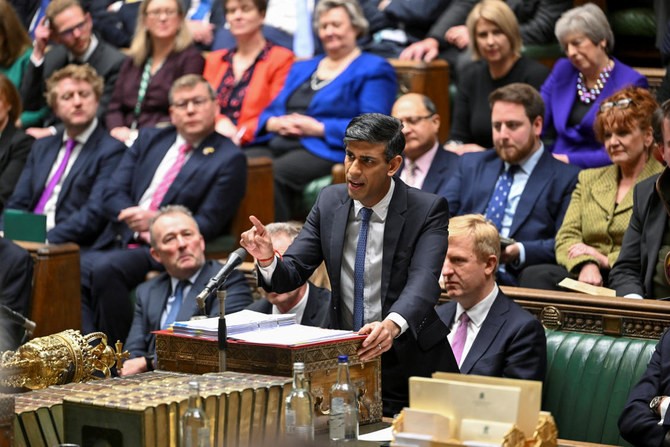LONDON: Prime Minister Rishi Sunak of Britain faced internal party strife after revealing a plan to bypass certain human rights laws to redirect migrants to Rwanda, exposing deep divides within his party. A day after the announcement, Sunak grappled with maintaining unity within the Conservative Party.
Under intense pressure, Sunak is contending with Conservative lawmakers demanding that Britain withdraw from international treaties to independently dictate its migration policy.
His immigration minister resigned on Wednesday, casting doubt on Sunak’s ability to secure parliamentary approval for his key policy.
There are murmurs among some Conservative members about a potential leadership challenge against Sunak.
Scheduled for a press conference at 1100 GMT, Sunak faces challenges in selling his proposal. One Conservative politician, reluctantly in favor of the Rwanda plan, acknowledged the ruthlessness of colleagues in ousting a struggling prime minister, expressing a sense of déjà vu.
This proposed legislation emerges after the UK Supreme Court deemed Rwanda unsafe for migrants arriving in small boats on England’s southern coast, ruling that the plan violated British and international law.
The Rwanda initiative serves as a pivotal aspect of the government’s strategy to curb illegal migration. However, the court’s decision presents a setback for Sunak, who aims to rejuvenate a faltering economy and is lagging behind the primary opposition party ahead of an anticipated election next year.
Sunak may elevate the upcoming parliament vote on the new legislation to a confidence vote, potentially triggering a national election if he faces a defeat.
While only one Conservative lawmaker has publicly advocated for a vote of no confidence, six colleagues reportedly support it privately. For a leadership challenge, 53 of the 350 Conservative lawmakers in parliament must submit no-confidence letters to the chairman of the 1922 Committee.
Sunak suffered his initial parliamentary setback this week as MPs voted to establish a compensatory body for victims of the infected blood scandal.
He implored his party to support the legislation, emphasizing its significance in initiating flights to Rwanda before the next election.
However, concerns persist. A recent poll highlighted immigration as one of the nation’s top three concerns, trailing behind only the economy and the National Health Service. While legal migration hit a record of 745,000 last year, approximately 45,000 individuals arrived in the UK illegally.
Presently, Rwanda can only accommodate a few hundred migrants from Britain. Despite government assertions that the plan will deter crossings, critics, including former ministers Suella Braverman and Robert Jenrick, advocate for stronger measures, even contemplating Britain’s exit from the European Convention on Human Rights.
Braverman voiced worries about potential legal disputes under the proposed bill but clarified that discussions on changing the party’s leader were not ongoing. She asserted that the bill was unlikely to be effective in stopping migrant boats.


